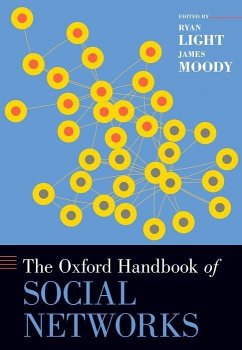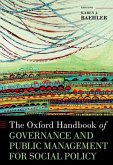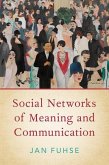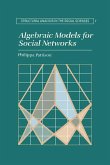- Gebundenes Buch
- Merkliste
- Auf die Merkliste
- Bewerten Bewerten
- Teilen
- Produkt teilen
- Produkterinnerung
- Produkterinnerung
The Oxford Handbook of Social Networks gathers forty leading scholars in social networks who link the distinct practices of social network scholars in the social sciences. Each chapter provides a succinct background to, and future directions for, distinctive approaches to analyzing social networks--theoretical, methodological, or substantive. The Handbook serves as a resource for graduate students and faculty new to networks looking to learn new approaches, scholars interested in an overview of the field, and network analysts looking to expand their skills or substantive areas of research.
Andere Kunden interessierten sich auch für
![The Oxford Handbook of Governance and Public Management for Social Policy The Oxford Handbook of Governance and Public Management for Social Policy]() The Oxford Handbook of Governance and Public Management for Social Policy206,99 €
The Oxford Handbook of Governance and Public Management for Social Policy206,99 €![Social Networks of Meaning and Communication Social Networks of Meaning and Communication]() Jan FuhseSocial Networks of Meaning and Communication106,99 €
Jan FuhseSocial Networks of Meaning and Communication106,99 €![The Oxford Handbook of the Sociology of Body and Embodiment The Oxford Handbook of the Sociology of Body and Embodiment]() The Oxford Handbook of the Sociology of Body and Embodiment214,99 €
The Oxford Handbook of the Sociology of Body and Embodiment214,99 €![Handbook for Research Students in the Social Sciences Handbook for Research Students in the Social Sciences]() Handbook for Research Students in the Social Sciences188,99 €
Handbook for Research Students in the Social Sciences188,99 €![Algebraic Models for Social Networks Algebraic Models for Social Networks]() Philippa PattisonAlgebraic Models for Social Networks136,99 €
Philippa PattisonAlgebraic Models for Social Networks136,99 €![Transformative Research and Evaluation Transformative Research and Evaluation]() Donna M MertensTransformative Research and Evaluation92,99 €
Donna M MertensTransformative Research and Evaluation92,99 €![The Bloomsbury Handbook of Creative Research Methods The Bloomsbury Handbook of Creative Research Methods]() The Bloomsbury Handbook of Creative Research Methods198,99 €
The Bloomsbury Handbook of Creative Research Methods198,99 €-
-
-
The Oxford Handbook of Social Networks gathers forty leading scholars in social networks who link the distinct practices of social network scholars in the social sciences. Each chapter provides a succinct background to, and future directions for, distinctive approaches to analyzing social networks--theoretical, methodological, or substantive. The Handbook serves as a resource for graduate students and faculty new to networks looking to learn new approaches, scholars interested in an overview of the field, and network analysts looking to expand their skills or substantive areas of research.
Hinweis: Dieser Artikel kann nur an eine deutsche Lieferadresse ausgeliefert werden.
Hinweis: Dieser Artikel kann nur an eine deutsche Lieferadresse ausgeliefert werden.
Produktdetails
- Produktdetails
- Verlag: Hurst & Co.
- Seitenzahl: 694
- Erscheinungstermin: 4. Dezember 2020
- Englisch
- Abmessung: 249mm x 183mm x 47mm
- Gewicht: 1327g
- ISBN-13: 9780190251765
- ISBN-10: 019025176X
- Artikelnr.: 59917076
- Herstellerkennzeichnung
- Libri GmbH
- Europaallee 1
- 36244 Bad Hersfeld
- gpsr@libri.de
- Verlag: Hurst & Co.
- Seitenzahl: 694
- Erscheinungstermin: 4. Dezember 2020
- Englisch
- Abmessung: 249mm x 183mm x 47mm
- Gewicht: 1327g
- ISBN-13: 9780190251765
- ISBN-10: 019025176X
- Artikelnr.: 59917076
- Herstellerkennzeichnung
- Libri GmbH
- Europaallee 1
- 36244 Bad Hersfeld
- gpsr@libri.de
Ryan Light is Associate Professor of Sociology at the University of Oregon and the Digital Scholarship Fellow in the Social Sciences at the University of Oregon Libraries. His work has appeared in Proceedings of the National Academy of Sciences, Annual Review of Sociology, and Social Forces, among others. James Moody is the Robert O. Keohane Professor of Sociology at Duke University. He has published extensively in the field of social networks, methods, and social theory with over 70 peer reviewed papers and extensive applied consultation with industry and DoD. He is Founding Director of the Duke Network Analysis Center, former editor of the online Journal of Social Structure, and co-founding editor of the American Sociological Association's new Open Access journal Socius.
* 1 Introduction
* Ryan Light and James Moody
* Network Basics and Theory
* 2 Network Basics: Points, Lines, and Positions
* Ryan Light and James Moody
* 3 Theories of Social Networks
* Jan Fuhse
* 4 Networks and Neo-Structural Sociology
* Emmanuel Lazega
* 5 Rethinking Networks in the Era of Computational Social Science
* James A. Kitts and Eric Quintaine
* 6 Networks, Status, and Inequality
* John Levi Martin and James P. Murphy
* Network Methods
* 7 Strategies for Gathering Social Network Data
* jimi adams, Tatiane Santos, and Venice Ng Williams
* 8 Social Network Experiments
* Matthew E. Brashears and Eric Gladstone
* 9 The network scale-up method
* Tyler H. McCormick
* 10 The Continued Relevance of Ego Network Data
* Jeffrey A. Smith
* 11 Dyadic, Nodal and Group-level Approaches to Study the Antecedents
and Consequences of Networks: Which Social Network Models to Use and
When?
* Filip Agneessens
* 12 An Introduction to Statistical Models for Networks
* Valentina Kuskova and Stanley Wasserman
* 13 Advances in ERGMs
* Dean Lusher, Peng Wang, Julia Brennecke, Julien Brailly, Malick Frye,
and Colin Gallagher
* 14 Modeling Network Dynamics
* David R. Schaefer and Christopher Steven Marcum
* 15 Causal Inference for Social Network Analysis
* Kenneth A. Frank and Ran Xu
* Network Dimensions
* 16 Case Studies in Network Community Detection
* Saray Shai, Natalie Stanley, Clara Granell, Dane Taylor, and Peter J.
Mucha
* 17 Three Perspectives on Centrality
* Stephen P. Borgatti and Martin G. Everett
* 18 Network Visualization
* James Moody and Ryan Light
* 19 The Spatial Dimensions of Social Networks
* Zachary P. Neal
* 20 Five Field-Experimental Tests of Preferential Attachment
* Arnout van de Rijt and Afife Idil Akin
* 21 Duality beyond persons and groups: culture and affiliation
* Sophie Mützel and Ronald Breiger
* 22 Networks of Culture, Networks of Meaning: Two Approaches to Text
Networks
* Ryan Light and Jeanine Cunningham
* 23 Historical Network Research
* Emily Erikson and Eric Feltham
* Network Landscape
* 24 Networks in Archaeology
* Carl Knappett
* 25 Networks, Kin and Social Support
* G. Robin Guathier
* 26 Demography and Networks
* M. Giovanna Merli, Sara R. Curran, and Claire Le Barbenchon
* 27 The Neuroscience of Social Networks
* Carolyn Parkinson, Thalia Wheatley, and Adam M. Kleinbaum
* 28 Computational Social Science, Big Data, and Networks
* Paolo Parigi and Bruno Abrahao
* 29 Networks: An Economic Perspective
* Matthew O. Jackson, Brian W. Rogers, and Yves Zenou
* 30 Social Capital and Economic Sociology
* Steve McDonald and Richard A. Benton
* 31 The International Trade Network
* Min Zhou
* 32 Maps of Science, Technology, and Education
* Katy Börner
* 33 Criminal Networks
* Chris M. Smith and Andrew V. Papachristos
* Ryan Light and James Moody
* Network Basics and Theory
* 2 Network Basics: Points, Lines, and Positions
* Ryan Light and James Moody
* 3 Theories of Social Networks
* Jan Fuhse
* 4 Networks and Neo-Structural Sociology
* Emmanuel Lazega
* 5 Rethinking Networks in the Era of Computational Social Science
* James A. Kitts and Eric Quintaine
* 6 Networks, Status, and Inequality
* John Levi Martin and James P. Murphy
* Network Methods
* 7 Strategies for Gathering Social Network Data
* jimi adams, Tatiane Santos, and Venice Ng Williams
* 8 Social Network Experiments
* Matthew E. Brashears and Eric Gladstone
* 9 The network scale-up method
* Tyler H. McCormick
* 10 The Continued Relevance of Ego Network Data
* Jeffrey A. Smith
* 11 Dyadic, Nodal and Group-level Approaches to Study the Antecedents
and Consequences of Networks: Which Social Network Models to Use and
When?
* Filip Agneessens
* 12 An Introduction to Statistical Models for Networks
* Valentina Kuskova and Stanley Wasserman
* 13 Advances in ERGMs
* Dean Lusher, Peng Wang, Julia Brennecke, Julien Brailly, Malick Frye,
and Colin Gallagher
* 14 Modeling Network Dynamics
* David R. Schaefer and Christopher Steven Marcum
* 15 Causal Inference for Social Network Analysis
* Kenneth A. Frank and Ran Xu
* Network Dimensions
* 16 Case Studies in Network Community Detection
* Saray Shai, Natalie Stanley, Clara Granell, Dane Taylor, and Peter J.
Mucha
* 17 Three Perspectives on Centrality
* Stephen P. Borgatti and Martin G. Everett
* 18 Network Visualization
* James Moody and Ryan Light
* 19 The Spatial Dimensions of Social Networks
* Zachary P. Neal
* 20 Five Field-Experimental Tests of Preferential Attachment
* Arnout van de Rijt and Afife Idil Akin
* 21 Duality beyond persons and groups: culture and affiliation
* Sophie Mützel and Ronald Breiger
* 22 Networks of Culture, Networks of Meaning: Two Approaches to Text
Networks
* Ryan Light and Jeanine Cunningham
* 23 Historical Network Research
* Emily Erikson and Eric Feltham
* Network Landscape
* 24 Networks in Archaeology
* Carl Knappett
* 25 Networks, Kin and Social Support
* G. Robin Guathier
* 26 Demography and Networks
* M. Giovanna Merli, Sara R. Curran, and Claire Le Barbenchon
* 27 The Neuroscience of Social Networks
* Carolyn Parkinson, Thalia Wheatley, and Adam M. Kleinbaum
* 28 Computational Social Science, Big Data, and Networks
* Paolo Parigi and Bruno Abrahao
* 29 Networks: An Economic Perspective
* Matthew O. Jackson, Brian W. Rogers, and Yves Zenou
* 30 Social Capital and Economic Sociology
* Steve McDonald and Richard A. Benton
* 31 The International Trade Network
* Min Zhou
* 32 Maps of Science, Technology, and Education
* Katy Börner
* 33 Criminal Networks
* Chris M. Smith and Andrew V. Papachristos
* 1 Introduction
* Ryan Light and James Moody
* Network Basics and Theory
* 2 Network Basics: Points, Lines, and Positions
* Ryan Light and James Moody
* 3 Theories of Social Networks
* Jan Fuhse
* 4 Networks and Neo-Structural Sociology
* Emmanuel Lazega
* 5 Rethinking Networks in the Era of Computational Social Science
* James A. Kitts and Eric Quintaine
* 6 Networks, Status, and Inequality
* John Levi Martin and James P. Murphy
* Network Methods
* 7 Strategies for Gathering Social Network Data
* jimi adams, Tatiane Santos, and Venice Ng Williams
* 8 Social Network Experiments
* Matthew E. Brashears and Eric Gladstone
* 9 The network scale-up method
* Tyler H. McCormick
* 10 The Continued Relevance of Ego Network Data
* Jeffrey A. Smith
* 11 Dyadic, Nodal and Group-level Approaches to Study the Antecedents
and Consequences of Networks: Which Social Network Models to Use and
When?
* Filip Agneessens
* 12 An Introduction to Statistical Models for Networks
* Valentina Kuskova and Stanley Wasserman
* 13 Advances in ERGMs
* Dean Lusher, Peng Wang, Julia Brennecke, Julien Brailly, Malick Frye,
and Colin Gallagher
* 14 Modeling Network Dynamics
* David R. Schaefer and Christopher Steven Marcum
* 15 Causal Inference for Social Network Analysis
* Kenneth A. Frank and Ran Xu
* Network Dimensions
* 16 Case Studies in Network Community Detection
* Saray Shai, Natalie Stanley, Clara Granell, Dane Taylor, and Peter J.
Mucha
* 17 Three Perspectives on Centrality
* Stephen P. Borgatti and Martin G. Everett
* 18 Network Visualization
* James Moody and Ryan Light
* 19 The Spatial Dimensions of Social Networks
* Zachary P. Neal
* 20 Five Field-Experimental Tests of Preferential Attachment
* Arnout van de Rijt and Afife Idil Akin
* 21 Duality beyond persons and groups: culture and affiliation
* Sophie Mützel and Ronald Breiger
* 22 Networks of Culture, Networks of Meaning: Two Approaches to Text
Networks
* Ryan Light and Jeanine Cunningham
* 23 Historical Network Research
* Emily Erikson and Eric Feltham
* Network Landscape
* 24 Networks in Archaeology
* Carl Knappett
* 25 Networks, Kin and Social Support
* G. Robin Guathier
* 26 Demography and Networks
* M. Giovanna Merli, Sara R. Curran, and Claire Le Barbenchon
* 27 The Neuroscience of Social Networks
* Carolyn Parkinson, Thalia Wheatley, and Adam M. Kleinbaum
* 28 Computational Social Science, Big Data, and Networks
* Paolo Parigi and Bruno Abrahao
* 29 Networks: An Economic Perspective
* Matthew O. Jackson, Brian W. Rogers, and Yves Zenou
* 30 Social Capital and Economic Sociology
* Steve McDonald and Richard A. Benton
* 31 The International Trade Network
* Min Zhou
* 32 Maps of Science, Technology, and Education
* Katy Börner
* 33 Criminal Networks
* Chris M. Smith and Andrew V. Papachristos
* Ryan Light and James Moody
* Network Basics and Theory
* 2 Network Basics: Points, Lines, and Positions
* Ryan Light and James Moody
* 3 Theories of Social Networks
* Jan Fuhse
* 4 Networks and Neo-Structural Sociology
* Emmanuel Lazega
* 5 Rethinking Networks in the Era of Computational Social Science
* James A. Kitts and Eric Quintaine
* 6 Networks, Status, and Inequality
* John Levi Martin and James P. Murphy
* Network Methods
* 7 Strategies for Gathering Social Network Data
* jimi adams, Tatiane Santos, and Venice Ng Williams
* 8 Social Network Experiments
* Matthew E. Brashears and Eric Gladstone
* 9 The network scale-up method
* Tyler H. McCormick
* 10 The Continued Relevance of Ego Network Data
* Jeffrey A. Smith
* 11 Dyadic, Nodal and Group-level Approaches to Study the Antecedents
and Consequences of Networks: Which Social Network Models to Use and
When?
* Filip Agneessens
* 12 An Introduction to Statistical Models for Networks
* Valentina Kuskova and Stanley Wasserman
* 13 Advances in ERGMs
* Dean Lusher, Peng Wang, Julia Brennecke, Julien Brailly, Malick Frye,
and Colin Gallagher
* 14 Modeling Network Dynamics
* David R. Schaefer and Christopher Steven Marcum
* 15 Causal Inference for Social Network Analysis
* Kenneth A. Frank and Ran Xu
* Network Dimensions
* 16 Case Studies in Network Community Detection
* Saray Shai, Natalie Stanley, Clara Granell, Dane Taylor, and Peter J.
Mucha
* 17 Three Perspectives on Centrality
* Stephen P. Borgatti and Martin G. Everett
* 18 Network Visualization
* James Moody and Ryan Light
* 19 The Spatial Dimensions of Social Networks
* Zachary P. Neal
* 20 Five Field-Experimental Tests of Preferential Attachment
* Arnout van de Rijt and Afife Idil Akin
* 21 Duality beyond persons and groups: culture and affiliation
* Sophie Mützel and Ronald Breiger
* 22 Networks of Culture, Networks of Meaning: Two Approaches to Text
Networks
* Ryan Light and Jeanine Cunningham
* 23 Historical Network Research
* Emily Erikson and Eric Feltham
* Network Landscape
* 24 Networks in Archaeology
* Carl Knappett
* 25 Networks, Kin and Social Support
* G. Robin Guathier
* 26 Demography and Networks
* M. Giovanna Merli, Sara R. Curran, and Claire Le Barbenchon
* 27 The Neuroscience of Social Networks
* Carolyn Parkinson, Thalia Wheatley, and Adam M. Kleinbaum
* 28 Computational Social Science, Big Data, and Networks
* Paolo Parigi and Bruno Abrahao
* 29 Networks: An Economic Perspective
* Matthew O. Jackson, Brian W. Rogers, and Yves Zenou
* 30 Social Capital and Economic Sociology
* Steve McDonald and Richard A. Benton
* 31 The International Trade Network
* Min Zhou
* 32 Maps of Science, Technology, and Education
* Katy Börner
* 33 Criminal Networks
* Chris M. Smith and Andrew V. Papachristos








